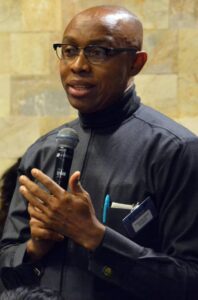
The bloggers’ detention is a calculated move to create a chilling effect on the media and deter critical reporting on corporate malpractice. “GTBank has procured the police to detain these bloggers since September 2024 on flimsy charges of cyberbullying and conspiracy,” he tweeted. “This is a blatant abuse of power and an attack on press freedom.”
— Prof. Chidi Anselm Odinkalu
By Abdulrahman Aliagan, Abuja
By suppressing press freedom and allegedly using state apparatus to detain journalists, Guaranty Trust Holding Company (GTCO), led by its Managing Director and CEO, Segun Agbaje, finds itself at the center of a growing controversy. Renowned human rights lawyer and law professor, Prof. Chidi Anselm Odinkalu, has called for a nationwide boycott of GTBank, accusing the financial institution of leveraging its influence to oppress journalists and stifle democracy.
Odinkalu’s condemnation stems from the three-month detention of bloggers Precious Eze, Olawale Olurotimi, Rowland Olonishuwa and Seun Odunlami reportedly orchestrated by GTCO following unfavorable reports about the company. The case highlights a dangerous trend in Nigeria: the gagging of journalists and the erosion of press freedom, fundamental pillars of any democratic society.
GTCO is embroiled in allegations of unethical financial practices, including declaring questionable profits of over N1 trillion, evading tax payments, and managing unauthorized accounts. Instead of addressing these accusations, GTCO allegedly retaliated by targeting journalists who dared to report on the company’s activities. Bloggers like Precious Eze, Olawale Rotimi, Rowland Olonishuwa, and Seun Odunlami were detained on charges of cyberstalking—a broad and often abused provision under Nigeria’s Cybercrime Act.
According to Odinkalu, the bloggers’ detention is a calculated move to create a chilling effect on the media and deter critical reporting on corporate malpractice. “GTBank has procured the police to detain these bloggers since September 2024 on flimsy charges of cyberbullying and conspiracy,” he tweeted. “This is a blatant abuse of power and an attack on press freedom.”
Odinkalu criticized GTCO’s deployment of a high-powered legal team, including three Senior Advocates of Nigeria (SANs), to pursue its case against the bloggers. “On October 23, GTBank showcased a team of 10 lawyers whom it has retained to oppress these poor journalists,” he noted, describing the legal strategy as disproportionate and oppressive.
He further revealed that the police investigation into the case lacked substantive evidence, with the investigating team recommending the bloggers be used as “scapegoats.” Such actions underscore the imbalance of power between wealthy corporations and individual journalists or bloggers, who often lack the resources to defend themselves.
Odinkalu’s call for a boycott of GTBank resonates beyond the immediate case of detained bloggers. It highlights broader issues of accountability, transparency, and press freedom in Nigeria. GTCO’s alleged financial misconduct—including accusations of tax evasion and questionable account practices—remains unaddressed by regulatory authorities like the Central Bank of Nigeria (CBN) and the Economic and Financial Crimes Commission (EFCC).
“This lack of accountability emboldens corporations like GTCO to suppress dissent and intimidate whistleblowers,” Odinkalu remarked. “If GTBank fails to stop this assault on press freedom, citizens should stop banking with it.”
The detention of journalists reflects a troubling trend in Nigeria, where press freedom is increasingly under attack. Journalists face harassment, intimidation, and imprisonment for exposing wrongdoing, creating a hostile environment for investigative reporting.
By targeting journalists, GTCO is not only silencing dissent but also undermining democracy. A free press is essential for holding corporations and governments accountable. Without it, corruption and abuse of power flourish unchecked.
Odinkalu’s call to action has sparked conversations about the role of civil society in defending press freedom. Advocacy groups like the Global Integrity Crusade Network (GICN) have already initiated legal proceedings to compel regulatory bodies to investigate GTCO’s alleged misconduct. However, more collective action is needed to protect journalists and ensure accountability.
The GTCO case exposes critical gaps in Nigeria’s regulatory and legal frameworks. The misuse of cybercrime laws to target journalists underscores the need for legislative reforms that protect press freedom and prevent corporations from exploiting vague legal provisions.
Odinkalu’s call for a boycott is a powerful reminder that citizens have a role to play in demanding accountability. By withdrawing their patronage from institutions that undermine democracy, Nigerians can send a clear message: the suppression of press freedom will not be tolerated.
The ongoing detention of journalists by GTCO is a litmus test for Nigeria’s commitment to democracy and justice. It raises urgent questions about the balance of power between corporations and the press and highlights the need for systemic reforms to safeguard press freedom.
As Odinkalu noted, “GTBank forgets that we are also customers.” The boycott call is not just about GTCO; it is a clarion call for all Nigerians to stand against corporate impunity and defend the principles of transparency, accountability, and freedom of expression that underpin a democratic society.
Aliagan is the Group Managing Editor, Time Nigeria Magazine, President, Nigerian Guild of Investigative Journalists (NGIJ) and Public Analyst based in Abuja.










